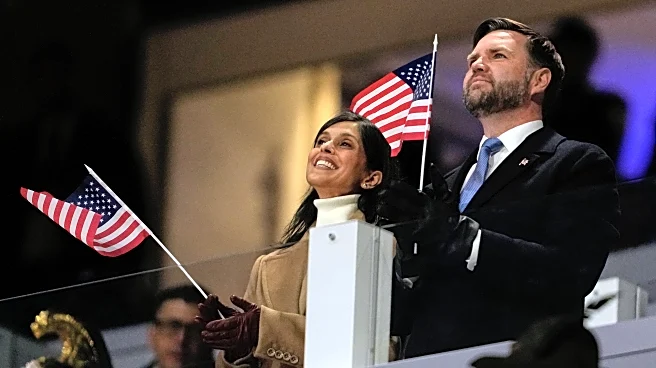What's Happening?
The U.S. Supreme Court recently heard arguments regarding the legality of tariffs imposed by President Trump's administration. Both liberal and conservative justices expressed skepticism about the legal basis
for these tariffs, which critics argue infringe on Congress's power to tax. Following the hearing, prediction markets indicated a reduced likelihood of the tariffs being upheld, dropping from 50% to 25%. The hearing led to a rise in major U.S. stock indexes, although the potential refunding of billions in collected duties could increase U.S. debt and affect Treasury yields, thereby impacting stocks. President Trump may use other executive powers to reinstate tariffs, adding uncertainty to the business environment.
Why It's Important?
The Supreme Court's decision on the tariffs could have significant implications for U.S. trade policy and economic stability. If the tariffs are overturned, it could lead to a refund of billions in duties, affecting government debt levels and potentially increasing Treasury yields. This scenario could pressure stock markets, impacting investors and businesses reliant on stable economic conditions. Conversely, if President Trump reinstates tariffs through other executive powers, it could lead to further unpredictability in trade relations and market dynamics, affecting industries reliant on international trade.
What's Next?
Should the Supreme Court rule against the tariffs, the White House may need to consider alternative trade measures or face the financial implications of refunding collected duties. Businesses and investors will likely monitor the situation closely, anticipating potential shifts in trade policy and market conditions. The administration's response could influence future tariff policies and international trade negotiations, impacting sectors such as manufacturing and agriculture that are sensitive to tariff changes.
Beyond the Headlines
The legal challenge to President Trump's tariffs highlights broader questions about executive power and its limits in trade policy. The case could set a precedent for how future administrations approach tariff implementation and congressional oversight. Additionally, the economic implications of the ruling could influence public opinion on trade policies and their impact on domestic industries.









